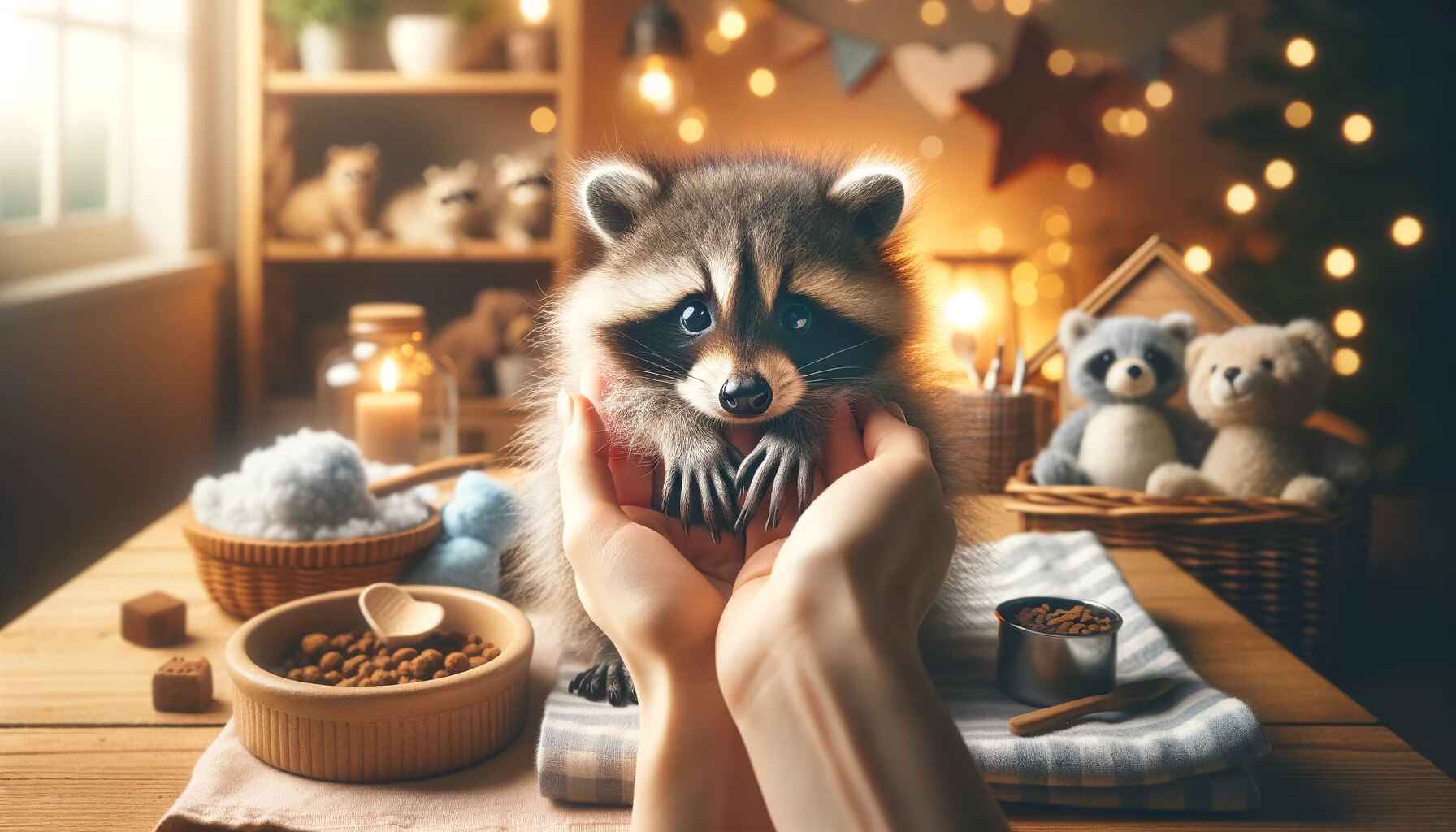While some might think of raccoons solely as wild animals, there’s a growing interest in adopting them as pets. However, raccoon adoptions come with unique challenges and considerations.
In this article, we’ll dive into raccoon adoptions, exploring the facts, considerations, and care required for these unique animals.
Understanding Raccoons
Raccoons, scientifically known as Procyon lotor, are highly adaptable mammals native to North America. They are known for their intelligence, dexterity, and curiosity. Here are some key facts about raccoons:
- Physical Characteristics: Raccoons typically have grayish fur, distinctive black “masks” around their eyes, and ringed tails. They have agile front paws, allowing them to manipulate objects with remarkable skill.
- Behavior: Raccoons are nocturnal omnivores, meaning they are most active during the night and have a varied diet that includes fruits, nuts, insects, small mammals, and even human refuse.
- Habitat: Raccoons are highly adaptable and can thrive in various environments, including forests, urban areas, and suburban neighborhoods.
- Life Span: In the wild, raccoons have an average lifespan of 2-3 years. However, in captivity, they can live significantly longer, up to 10-12 years or more with proper care.
Considerations Before Adopting a Raccoon
Before deciding to adopt a raccoon, it’s crucial to consider several factors:
- Legality: Laws regarding raccoon ownership vary by region. In many places, it is illegal to keep raccoons as pets due to their potential to transmit diseases and their wild nature. Always research local regulations before considering adoption.
- Ethical Considerations: Raccoons are wild animals and have complex needs that may be difficult to meet in a domestic setting. Consider whether it is ethical to keep a raccoon confined in a home environment.
- Space and Enclosure: Raccoons require ample space to roam and explore. A large, secure outdoor enclosure with climbing structures and hiding spots is essential for their well-being.
- Time and Commitment: Raccoons are intelligent and social creatures that require stimulation and interaction. Be prepared to dedicate time and effort to enriching their environment and meeting their needs.
- Health Considerations: Raccoons can carry diseases such as rabies and roundworm, which can pose risks to humans and other pets. Regular veterinary care and vaccinations are necessary to ensure the health of both the raccoon and its human companions.
The Adoption Process
If you’ve carefully considered the responsibilities of raccoon ownership and are legally permitted to adopt one, the next step is finding a reputable source:
- Rescue Organizations: Some wildlife rescue organizations may have rehabilitated raccoons that are not suitable for release into the wild and are available for adoption to qualified individuals.
- Licensed Breeders: In some areas where raccoon ownership is legal, there may be licensed breeders who specialize in raising raccoons for captivity. It’s essential to thoroughly research any breeder and ensure they adhere to ethical standards and animal welfare regulations.
- Legalities and Permits: Depending on your location, you may need to obtain permits or licenses to legally keep a raccoon as a pet. Be sure to comply with all legal requirements to avoid fines or confiscation of the animal.
- Education and Preparation: Before bringing a raccoon into your home, educate yourself about their specific needs and behaviors. Prepare a suitable enclosure and gather necessary supplies, such as food, bedding, and enrichment toys.
Caring for a Pet Raccoon
Once you’ve welcomed a raccoon into your home, providing proper care is essential for their health and well-being:
- Diet: Raccoons are omnivores with a varied diet. Commercially available raccoon diets supplemented with fruits, vegetables, and occasional treats can provide balanced nutrition. Avoid feeding them processed human foods, as these can be harmful to their health.
- Enrichment: Raccoons are intelligent and curious animals that thrive on mental stimulation. Provide them with toys, puzzles, and opportunities for foraging to keep them mentally engaged and prevent boredom.
- Socialization: While raccoons are not domesticated like dogs or cats, they can form bonds with their human caregivers. Spend time interacting with your raccoon through play and training to build trust and strengthen your relationship.
- Healthcare: Regular veterinary check-ups are essential for monitoring your raccoon’s health and addressing any medical concerns promptly. Vaccinations, parasite prevention, and dental care are all important aspects of raccoon healthcare.
- Legal Compliance: Continue to adhere to any legal requirements or permits associated with raccoon ownership. Failure to comply with regulations can result in legal consequences and may jeopardize the well-being of your pet.
Conclusion
Raccoons are fascinating creatures with complex needs and behaviors. While some individuals may be drawn to the idea of keeping a raccoon as a pet, it’s essential to carefully consider the ethical, legal, and practical implications before making a decision.
By understanding the responsibilities of raccoon ownership and providing proper care, individuals can ensure the health and well-being of these unique animals in a domestic setting. Whether through adoption from a rescue organization or a licensed breeder, providing a loving and enriched environment for a pet raccoon can be a rewarding experience for both the animal and its human companions.
Read our latest post on raccoon: Understanding Raccoon Poison: Risks & Alternatives










